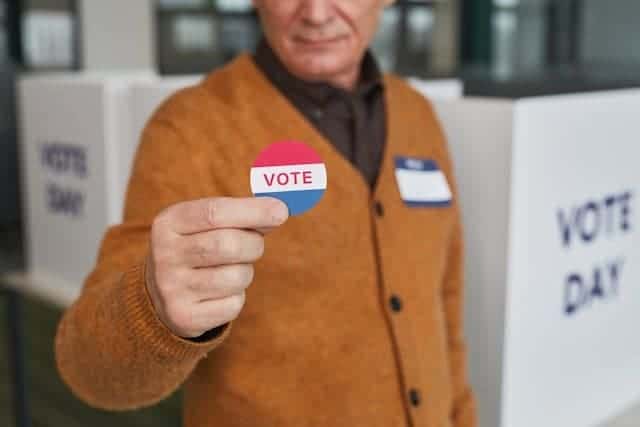One aspect of politics that has always baffled me is the way in which some voters appear to vote against their own best interests—economic or social. In a democracy, everyone assumes that voters make choices based on what will most benefit them or their community.
However, studies and observations over time show that many voters seem to go for candidates or policies that do not align with their own best interests. There are a few possible explanations for why someone would vote against their own best interests: psychology, social identity, misinformation, and historical context.
Contents
 Social and Cultural Identity Over Economic Interests
Social and Cultural Identity Over Economic Interests
For many voters, political choices are more about identity than material benefits. I’m sure you’ve heard the political pundits use the phrase “identity politics.” What do they mean by that? To explain it in simple terms: it’s a way of looking at groups of voters, or “buckets,” based on race, gender, religion, education, etc. Take the 2024 election for example—people in legacy media have been discussing the fact that Latino men and young Black men moved to Trump in this election.
There are political analysts who don’t like to engage in identity politics, but I would say the voters themselves dislike it even more. The “buckets” of voters that bother me the most are the “college-educated” and “non-college-educated.”
While there may be data points to talk about when it comes to who is voting for who, I would prefer if the level of education a voter has attained be left out of the conversation. There are other “buckets” you could put people in. Income level maybe? Where they live in terms of city, suburb, or rural? Better yet, let’s instead discuss classes of people. Working class voters come in all races, genders, religious affiliations, and political ideology.
If we want to work toward uniting a country that is currently extremely divided, one way to do that would be to find common ground among groups. The working class, for example, is made up of Americans who are all concerned about wages, worker’s rights, labor unions, paid family leave, healthcare, corruption in government, etc.
People often vote in alignment with their cultural, racial, or religious group, seeing these affiliations as more important than their current personal economic situation. I would venture to guess that the voters who are putting their economic situation below identity are doing just fine. If you are struggling to buy food and facing eviction, economic situation is going to be more important than your cultural, racial, or religious group affiliation.

The only instance where the previous concept may not apply is in the current Republican party, where you currently have members who refer to themselves as Christian Nationalists (Josh Hawley, Marjorie Taylor Green and other members of the Freedom Caucus).
You also have a member like Paul Gosar who has attended and spoken at White Nationalist events. These types of identity-based allegiances can outweigh the direct economic benefits offered by a candidate with a differing platform.
For example, white working-class voters in some regions of the U.S. might vote for candidates whose policies don’t benefit them economically, simply because those candidates appeal to their sense of patriotism, social values, or cultural identity.
If a voter feels that their identity as a “Christian Nationalist patriot” who doesn’t think gay marriage should be legal is the most important thing to them, then it won’t matter what amazing policies are being proposed by the other candidate. They are going to vote against their own interests in order to maintain that identity.
 Misinformation and Media Influence
Misinformation and Media Influence
In an age of social media and partisan news outlets, misinformation plays a major role in shaping voters’ perceptions and decisions. Voters who are exposed to one-sided narratives, conspiracy theories, or manipulated information may make decisions that don’t reflect their actual interests. These distorted realities can convince individuals that a particular candidate, party, or policy is beneficial for them when, in fact, it is not.
Fox News is the perfect example of this. During the COVID pandemic, when the CDC was releasing guidelines to prevent more deaths, Fox News was downplaying the severity of the virus, demonizing the CDC, and telling their viewers not to wear masks and to rebel against shutdowns.

Eventually they were spreading disinformation about the COVID vaccine, urging viewers not to get it. Voters in that media bubble would never support a candidate who ran on mask-wearing and vaccine mandates. Nothing else about that candidate’s policies would matter.
Echo chambers, where people are surrounded by information that only reinforces their existing biases, are more common now than ever before. Social media algorithms often prioritize content that makes people angry or anxious, which can lead people to vote in ways that seem irrational or counterproductive. If someone is seeing a steady flow of misinformation about the candidate who would improve their economic condition, they would probably vote against their own best interests.
For example, voters may back candidates who support tax cuts for the wealthy, believing it will create jobs or stimulate the economy, despite evidence that such policies often benefit the rich disproportionately.
 Short-Term vs. Long-Term Thinking
Short-Term vs. Long-Term Thinking
Many voters focus on short-term rewards or immediate benefits when making electoral decisions, even if these come at the expense of long-term well-being. Politicians often exploit this way of thinking by offering immediate benefits, such as tax cuts, subsidies, or promises of jobs, even if these measures are unsustainable or could harm the economy in the future.
Politicians will also lie about things they will do if elected, not concerned about consequences and hoping you will either forget or not bother to hold them accountable. Unfortunately, this is a common tactic used in politics.

For instance, a voter might support a candidate who promises to lower taxes or roll back environmental regulations, which could provide short-term economic relief but result in long-term harm to the environment or public health. The charm of immediate economic relief can make it difficult for voters to think about the future consequences of their choices, just like every other human being on the planet who makes impulsive decisions.
 Distrust of Government and Elites
Distrust of Government and Elites
Some voters, particularly in marginalized communities, may feel that the political system is stacked against them, no matter who is in power. This widespread distrust can lead to a preference for candidates who seem to “shake up” the status quo, even if these candidates offer policies that won’t necessarily benefit these voters in the long run.
Voters who feel alienated by traditional political elites might opt for outsider candidates or those who promote anti-establishment rhetoric. In some cases, these candidates promote policies that undermine social programs or public services, yet their outsider status and message of rebellion against the system can still appeal to voters who feel ignored by mainstream politicians. This could cause them to vote against their own best interests.
We are currently experiencing a shift in our political system where Americans are tired of the establishment politicians who never do anything to improve their lives once they are elected into office.
The country was primed and ready for a populist politician to come onto the scene. Unfortunately, that politician was Donald Trump, a fake populist who doesn’t put forth the economic populist agenda. He instead uses some of the tactics already mentioned. He uses hate, fear, and anger to drive people to vote for him.
In 2016, Donald Trump ran on Drain the Swamp, only to engage in corruption benefitting friends, family, and himself while in office. Rather than draining the swamp, he created a swamp inside the White House. Regardless, his voters still support him, believing he was taking on the establishment despite evidence to the contrary.
 Psychological Biases and Cognitive Dissonance
Psychological Biases and Cognitive Dissonance
Human beings are often motivated by emotional factors rather than purely rational calculations. Cognitive biases—such as the “confirmation bias,” where people seek out information that confirms their preexisting beliefs—can strongly influence voting behavior. Even when confronted with facts that suggest a candidate or policy might not be in their best interest, voters may rationalize their decision by dismissing contradictory evidence.
If someone were to vote against their own interests in this situation it would be akin to defending an ex who lied to them because of all of their other great qualities. Or ignoring warnings from someone who told them that a spouse was cheating on them.
Cognitive dissonance also plays a role in why people vote against their own best interests. Once someone has made a political decision, especially one tied to their identity or values, they may experience discomfort when confronted with facts that challenge their choice. This discomfort can lead them to dismiss the evidence and continue supporting policies or candidates that don’t align with their best interests, because it feels easier or more consistent with their worldview.
 Economic Self-Interest Isn’t Always Material
Economic Self-Interest Isn’t Always Material
The concept of “economic interest” isn’t always about money. For some, the concept of “economic well-being” might include factors like job security, home ownership, or access to certain cultural or social privileges that they believe will be threatened by certain policies. In this situation it actually makes sense to vote against your own best interests—if keeping things the same is more important than positive changes.
For example, voters in rural or post-industrial areas might support policies that maintain the status quo, even if these policies don’t directly benefit their financial situation, because they believe these policies will preserve their way of life or cultural heritage. An example of this is Stephen Miller saying that “America is for Americans only” in reference to the mass deportation policy.
 Emotional Appeals and Populism
Emotional Appeals and Populism
A populist is a politician that fights for the average American. They propose policies that are popular. Paid family leave and raising the minum wage are just 2 of the policies that the large majority of Americans support.

Fake populist leaders and movements, on the other hand, will often win over voters by making emotional appeals, focusing on issues like fear, anger, or resentment. These leaders might promise to fight for the “common man” against the elites or outsiders, even if their proposed policies don’t offer concrete solutions to everyday problems.
This strategy can be highly effective in garnering support from people who feel disenfranchised or overlooked by the political system. This is exactly how Donald Trump was able to garner support in the 2024 election.
Rather than present policies and solutions to problems, he preferred to use problems to stoke hate and fear. One example is the Border security bill brought forth by Republican Senator James Lankford after spending months negotiating with an Independents and Democrats.
The Democrats gave in and allowed Lankford to put forth the most conservative border security bill in U.S. history. Democrats were more concerned about fixing the issues at the border than playing partisan politics. Voters who consider immigration to be their top issue would vote against their own best interests if they voted for Republicans after they stopped Democrats from fixing the border.
The bill would have added 1,500 Border Patrol agents to the border, which is why the Border Patrol union endorsed the bill. It would have added additional immigration judges and lawyers so asylum cases could be heard immediately instead of releasing people into the country while they await their hearing.
The bill also funded the installation of technology that can detect fentanyl coming across the border in vehicles, which is how 90% of fentanyl enters the country—through Ports of Entry.
Every Republican in the House and Senate supported the bill and were going to vote on it… until Donald Trump called Speaker Mike Johnson and told him not to put it on the floor for a vote because 1) It would solve the border crisis and give President Biden a win and 2) he wanted to run on immigration in the 2024 election and he couldn’t do that if the crisis was fixed.
Mike Johnson killed the bill even though this showed the American people that Trump cared about winning the election more than protecting American people from the “criminals and murderers” coming across the border. At least that’s what should have happened, but Conservative media and Trump told supporters that it was a “bad bill.” Unfortunately, not everyone knows they can go to Congress.gov and read every bill themselves.
Republicans ran ads about women who were murdered by illegal immigrants, blaming Kamala Harris for letting them in when, in reality, she supported the border security bill that would have stopped the high number of border crossings. Trump didn’t want it to pass.
That’s just one example—voters who care about fixing the immigration system vote for the party that prefers to complain about it rather than put forth solutions to fix it.
In the case of a populist or a fake populist, voters may feel emotionally invested in a candidate or movement and may choose loyalty to that candidate over a careful evaluation of policies and their real-world implications. MAGA is a perfect example of this phenomenon.

Populist rhetoric often shifts focus away from practical governance and toward emotional satisfaction, a tactic that can sway votes even when the policies promoted are not in the voters’ best financial or social interest.
What can we do to help voters cast ballots for a candidate advocating for their best interests and putting forth policies that will better their lives? At a time when Americans are more divided than ever, it’s difficult to communicate without being attacked, especially when you have been labeled “the enemy within.”
Until current Republican party leadership is no longer in power, the voters simply will not listen to concerns and attempts to help them.
Voting is a complex process influenced by a range of psychological, social, and informational factors. While it feels better to just assume that voters will always act in their own best interests, the reality is that decisions are often shaped by identity, emotion, misinformation, cognitive biases, and distrust of the political system. Understanding these dynamics is important—not just for explaining why some voters make seemingly irrational choices— but also to design better systems of communication and engagement that can address these deeper, often subconscious, forces driving electoral behavior.
Do you have any ideas about how we could reach voters who seem to vote against their own best interests? Is it even possible with the echo chambers and media bubbles we are in? Let me know in the comments below!




